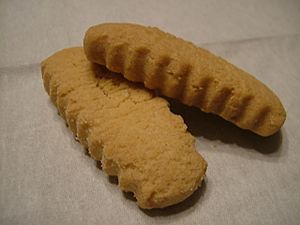Chinsuko facts for kids
 |
|
| Type | Confectionery/Biscuit |
|---|---|
| Place of origin | China, Japan |
| Region or state | Okinawa |
| Main ingredients | Lard, Flour, Sugar |
Chinsuko (ちんすこう/金楚糕, Chinsukō) is a special sweet treat from Okinawa, a group of islands in Japan. It's a traditional sweet that has been made there for a very long time, even since the days of the old Ryukyu Kingdom. Today, Chinsuko is often bought as a souvenir by people visiting Okinawa.
This tasty treat is a small, crunchy biscuit. It's mostly made from lard (a type of fat) and flour. Chinsuko has a gentle, sweet taste and a texture that's quite similar to shortbread, which is another popular buttery biscuit.
Where Did Chinsuko Come From?
The exact story of how Chinsuko began isn't fully known. However, experts believe it might have been inspired by other baked goods from long ago.
- Chinese Cookies: One idea is that Chinsuko is similar to a traditional Chinese cookie called Taosu (桃酥). Taosu is also made from flour and looks a lot like Chinsuko.
- Portuguese Cake: Another theory suggests it came from Castella, a type of sponge cake. Portuguese traders brought Castella to Asia, and it became popular in both Chinese and Japanese cooking.
- Spanish Biscuits: Some people think Chinsuko has a lot in common with Polvorón, a crumbly biscuit from Spain. They share similar textures and ingredients.
- Silk Road Influence: There's also a theory that Chinsuko was created when people in Okinawa tried to copy Portuguese bolo (a type of cake or bread) that arrived through the Silk Road. They would have used ingredients that were available on the islands.
No matter its exact origin, Chinsuko has become a beloved part of Okinawan culture and a delicious snack enjoyed by many!
See also
 In Spanish: Chinsukō para niños
In Spanish: Chinsukō para niños
 | Georgia Louise Harris Brown |
 | Julian Abele |
 | Norma Merrick Sklarek |
 | William Sidney Pittman |

